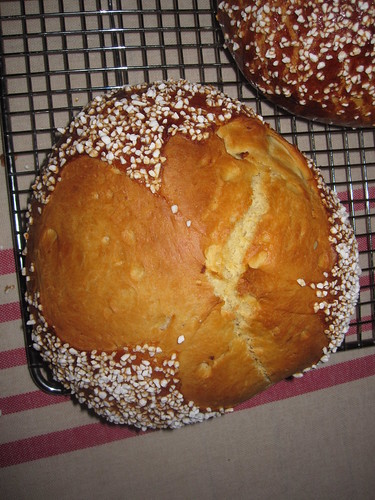
So this year, I asked her about recipes she'd used and she sent me one she said was rather good. But then she also mentioned a version with white wine, and I was way too intrigued and asked for that recipe as well. It is here in German. I've lately started to refresh my German language skills in a more targeted way and this recipe adds the extra dimension of having several new words, so will be a learning experience as well.
Ingredients
Makes 6
250 ml white wine
2 tsp anise seeds
1 dl dark rum
1 dl raisins
250 g milk
140 g granulated sugar
2 x 7 g sachets quick yeast
1 kg strong white flour
2 large eggs
5 large egg yolks
6 g salt
zest from a large lemon
250 g soft unsalted butter
6 tsp nib sugar
1 egg for egg wash
Method
- Heat up the white wine and stir in the anise seeds, then set aside for 3 h, then sieve to remove the seeds.
- Heat up the rum and add the raisins, then set aside for 2 h.
- Sift the flour.
- In a large glass bowl make the poolish/pre-ferment: warm up the milk with 30 g of the sugar to about 30 °C and stir in the yeast until it's fully dissolved.
- Add 80 g of the flour and stir to get a batter. Cover and let stand for 20 minutes in a warm place. It should increase in size significantly, so make sure to use a large bowl.
- In the bowl of the dough mixing machine, whisk together the 2 large eggs, the egg yolks, salt, lemon zest and remaining sugar for about 5 minutes until it goes really pale and fluffy.
- Add the remaining flour, the poolish/pre-ferment, white wine, raisins along with the rum they were soaked in and mix to a soft dough.
- Check that the gluten has developed with the window pane test and then add the butter in chunks and get it well incorporated into the dough.
- Remove the mixing attachments from the dough, cover the bowl and leave to rise for an hour.
- Break the egg for the egg wash and whisk it to mix the yolk and white. Leave to stand and keep stirring every now and then.
- Turn out the dough, fold and turn it a few times, then let rise for a further hour.
- Line three baking sheets with baking paper and have the nib sugar ready in a small bowl along with the egg wash.
- Weigh the dough, then divide into 6 equal parts.
- Shape each into a round tight ball. Place two on each baking sheet on a diagonal, so that they don't stick together as they proof, and brush well with the egg wash and leave to proof for about 30 minutes.
- Pre-heat the oven to 170 °C.
- Just before baking each sheet, brush a second time with the egg wash, then sprinkle with nib sugar and using scissors, make three cuts centred in the middle.
- Bake each sheet for 30 minutes until the breads go golden brown.
- Remove from the oven and transfer to a wire rack to cool down completely.
I made these the day before Lundulph's family arrived for Easter. I served them to our guests as a mid-morning snack and they were wonderfully fluffy and disappeared alarmingly quickly. It was lighter than the kozunak and stayed soft surprisingly long - it was fine for breakfast 2 days after baking and only on day 3 did we need to whizz it in the microwave to restore the fluffiness and softness. I had intended to save one and give to my colleague as thanks for sharing this recipe, but to be honest, these breads were just way too tasty to want to share.
A note on the white wine - the recipe didn't really specify what to use, so I thought a dessert wine would be best and I bought a fancy muscat wine, Domaine Tailhades Muscat St Jean de Minervois. It was pricey and came in a half bottle and I had to hide it from Lundulph, who fancied using it as a dessert wine. I have some left over, so I'll make a single batch of the Osterpinze once we get through all the chocolate we acquired.
A note on the anise seed - I wasn't able to get hold of these, but I had star anise in my spice collection, so I used that instead, but it was barely noticeable, I didn't use enough of it. I quite like the anise flavour, so I would have preferred to have more of it. The original recipe stated that 2 tsp of anise seed would be around 2 g, so I measured the star anise to 2 g. Perhaps this was the issue, I should just have put in a few more of the beautiful stars.
I don't know if it was down to the wine or something else, I was very surprised that these breads stayed soft for so long. Hopefully it wasn't just pot luck.
No comments:
Post a Comment